Rebuilding Together: Ensuring ‘Safe and Healthy Housing,’ Serving as a ‘Broker of Community’

It’s hard to imagine anyone more fulfilled professionally or as a community member than Patti Klein, executive director of Rebuilding Together-AFF.org (RT-AFF), the “AFF” referring to Arlington, Fairfax and Falls Church.
Since 1996, Klein has served on the staff – first as a project coordinator and now as executive director – of the nonprofit that “makes critical repairs at no charge for low-income homeowners and nonprofit organizations” to ensure “safe and healthy” living environments and “help seniors age in place.” According to their LinkedIn profile, RT gives “special priority to seniors, people living with disabilities, families with children and veterans.”
The Falls Church Independent interviewed Klein to find out more about what Rebuilding Together does in the area, their nonprofit approach, and their impact on the community. We had first encountered friendly RT volunteers at their information tent at the Falls Church Fall Festival and they put us in touch.
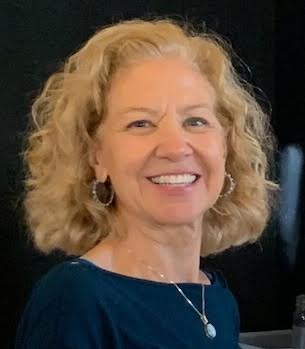
Rebuilding Together’s Approach
So, what’s RT all about? “We believe that everybody should live in safe and healthy housing. That’s our goal,” Klein said. “We go into people’s homes, identify hazards in the home, and correct them. First, we ask the person who applied to us and is living there why they called and what they need…. And then we ask probing questions, like ‘Do they have mobility issues?,’ ‘Are they trying to age-in-place?,’ and different things they might not have thought about. And then we do an assessment of the home: ‘Do they have safe ingress and egress?,’ ‘Do they have the ability to get upstairs and downstairs?,’ ‘Is the house water-tight?’
RT has developed a list of 25 Health and Safety Priorities to determine a home or nonprofit’s safety. “So, we do this assessment, make a list, and try to figure out whether or not we’re going to be able to tackle some or more of those things we’ve identified and they’ve requested,” Klein said.
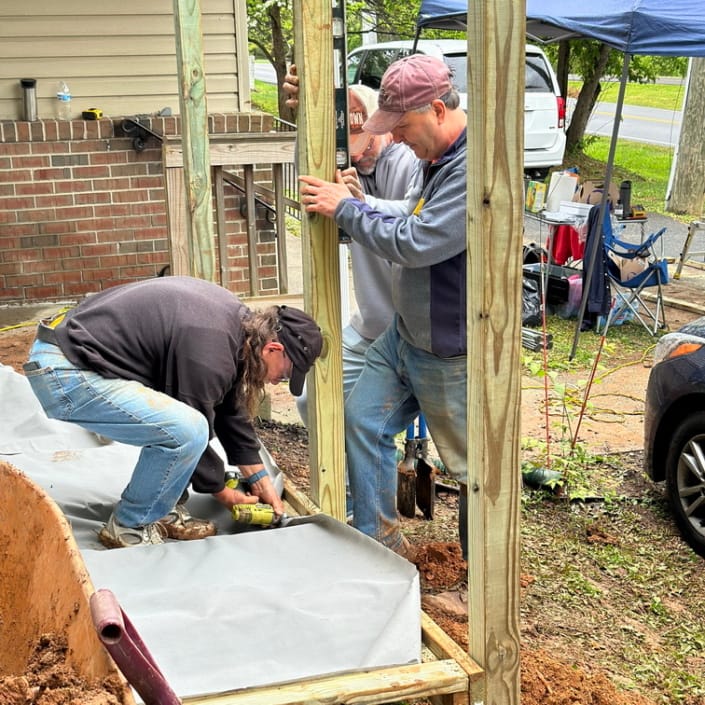
To be eligible for RT’s no-cost home improvement assistance, applicants’ “total gross house income” cannot exceed “80 percent of the [Area Median Income] AMI” set by the U.S. Department of Housing and Urban Development (HUD). “So people apply and I will tell you we do get probably a couple hundred people who apply every year… and on average each year lately we’ve been helping between 110 and 120 households,” Klein said.
Klein recalls fond memories of a recent and highly challenging project in Greater Falls Church. “We worked on a lady’s home and one of the things we did was build her a ramp,” Klein recounted. “So we were hoping to partner with a corporation and we just had the worst heat ever during the summer. We were going to do it in May but it poured. And then we were going to do it in the summer, but it was like 95-degree heat. And the corporation was like, ‘We can’t send our people out.’ So, our staff and a couple of our key volunteers – we went out there and we built the ramp, because we were saying, ‘We can’t wait anymore.’ And I think we did grab-bars and other things like that, but definitely the ramp was the primary thing. Because I actually worked on that one.”
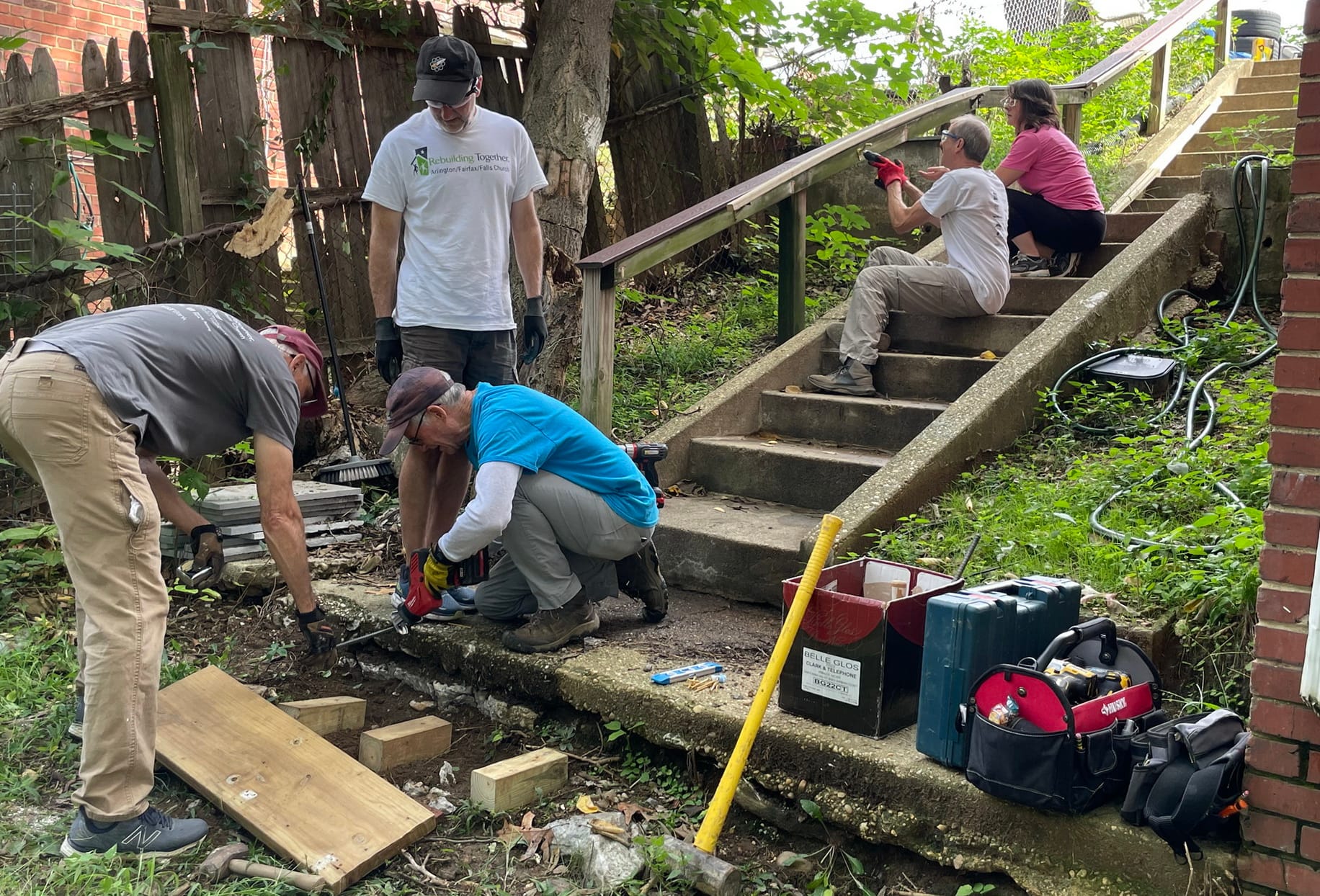
Going for the Grassroots
What attracted Klein to work for RT in the first place? “So, in the ‘80s and ‘90s [Laughs], I worked for a national nonprofit called ‘Communities in Schools’ and did that for 10 years,” she recalled. “Loved it. It was wonderful. But, because I was at a national level, I didn’t really feel the impact of what I was doing…. So I decided to attempt to go grassroots. And I saw this little teeny ad in The Washington Post, in print, for ‘Christmas in April,” which… was the previous name of ‘Rebuilding Together.’ ”
The Origins of the ‘Christmas in April’ Movement
Klein remembered how in the ‘90s her boss at Communities in Schools used to write one of the 1973 founders of Christmas in Action, later Christmas in April, Bobby Trimble, from Midland, Texas.
According to the Midland Reporter-Telegram, Trimble was “teaching a class of young men from the book of James in the Bible, Chap. 2: 14-17,” when he told his class, ‘There is more to being a Christian than just going to church.’ The lesson encouraged the class to step outside the church walls and work on homes of women without husbands in the community. At first the repairs were small, such as repairing gates, furnaces, evaporative coolers, etc. This developed into larger projects and continued through the summer of 1973; the seeds began to sprout.”
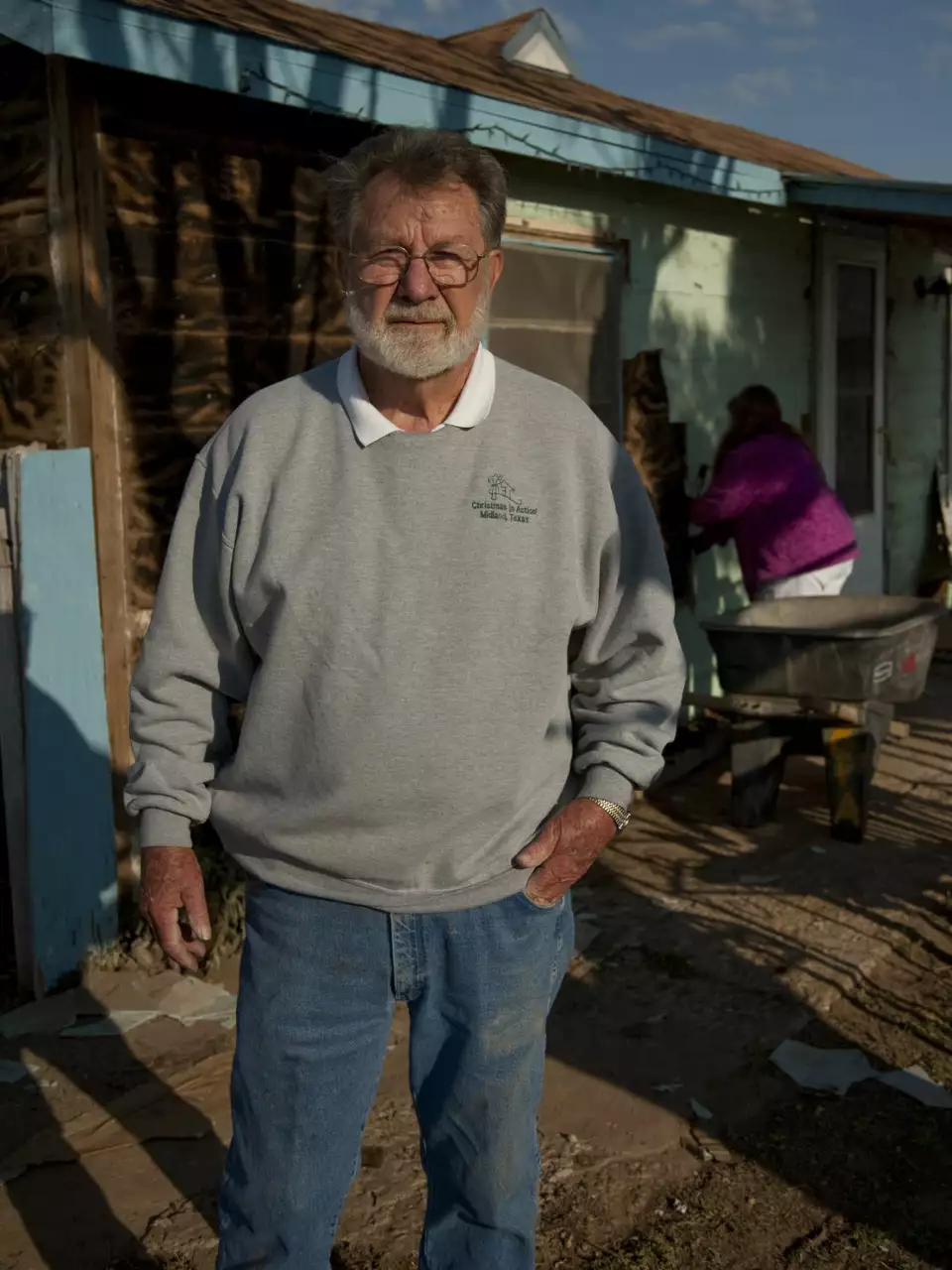
The name “Christmas in April” came from a grateful homeowner who was so appreciative of the volunteers’ work on her home that she said, “It’s like Christmas in April!”
Klein recalled how “a guy at Reader’s Digest” wrote about the group and a “couple of people in the Falls Church Episcopal” began volunteering for Christmas in April in the area. “So, that’s the only way I knew about it because we didn’t have internet back then, so [Laughs] I just saw this little teeny ad in The Washington Post and I applied,” Klein remembered.
The Hug that Sealed the Deal
“The woman who hired me, she and I clicked, and she’s one of my best friends to this day – But, literally, I was getting paid – at poverty level. [Laughs]. And that was in 1996. That’s how long I’ve been doing this and loving this,” Klein said.
“And I was single and had no money and I remember thinking to myself, ‘Okay, I’ll do this for a year and see how it works and then I can always go back to a national nonprofit or accounting or something and get paid a fair living wage,’ Klein said.
“And it was about six months in and I finally went from wearing a suit every day to wearing jeans, because when you go out to people’s houses it’s kind of a weird thing to have someone come to your house in a suit…. And I went to a house in Arlington and I met this lovely, lovely woman and I was walking away and she called me back and she asked, ‘Can I give you a hug?’ And I said, ‘You betcha!’ And I was sold from that point on.”

Klein laughed as she recalled that when she started she “knew nothing about housing” or home repair work, but she did have a knack for understanding people and knowing what was and wasn’t working for them. She also holds a Bachelor's degree in Psychology from George Mason University.
Having lived all over the world, Klein had seen a thing or two. “I was born in Japan, lived in Maryland, came back to Japan, came back to Maryland, spent my high school years in Germany, came back to Maryland, and then as an adult I’ve been in Virginia since I was like 21. In northern Virginia, Arlington and Fairfax… My dad worked for the government, but we lived on a military base.”
How ‘Christmas in April’ Grew to Become ‘Rebuilding Together’
In the 1980s, President Reagan “honored Bobby,” Klein remembered. “And then a guy named Trevor Armbrister who was with Reader’s Digest wrote a story about Bobby and Christmas in April” in Texas. In 1982, Armbrister’s local Christmas in April group “rehabilitated 2,500 houses in the Washington area for poor, elderly or disabled homeowners,” The Washington Post wrote in Arbrister’s 2006 obituary.
“And then once people read about it, Christmas in April started popping up all around the country,” Klein remembered. “Then, in 1988, I believe, they established Christmas in April, Inc. and that was established by a woman named Patty Johnson and the national arm of Christmas in April was in D.C. but all the affiliates came under Christmas in April. And somehow Bobby was good with that. He just ran his Christmas in April in Midland and everybody just started independent nonprofits called 'Christmas in April.' ”
Through the ‘90s and into the 2000s various independent Christmas in April programs flourished around the country. But, the name no longer made sense because groups of volunteers were helping make homes “safe and healthy” year-round, not just in April.
So, in 2000, Christmas in April formerly changed its name to Rebuilding Together. “And it wasn’t just Christian groups,” Klein said. “It was corporations, it was faith-based groups, a lot of synagogues got involved, so they would call it ‘Sukkot in April.’ There were 100 different names. So they decided to change it to be more descriptive of what we actually do, Rebuilding Together.”
While every RT group is unique – for example, some are all-volunteer and some are staffed and each has a delineated geographical area of service – they all share a “common mission of ‘repairing homes, revitalizing communities, and rebuilding lives,’ “ Klein said.
Honoring Rebuilding Together-AFF’s Staff
Clearly, Klein is proud of her three full time staff and hundreds of volunteers and the enormous impacts they’ve had on people’s lives. “So far, we’ve done 2775 projects… And, just in volunteer labor alone, the value is over $16 million,” Klein said, noting that their website figures need updating.
She goes out of her way to credit Director of Programs, John Armstrong, who has “extensive experience building homes” having “developed residential housing” for 25 years and then joining RT after retiring. “I know nothing,” Klein said about her own construction acumen, but “he’s got extensive skills.”

Klein is also particularly proud of the group’s RT Express Program, run by Director of Partnerships, Don Ryan. He helped streamline the nonprofit’s handyman services so that homeowners can receive fast and efficient repairs and upgrades “like going through a checkout line.”

The RT Express Program was developed, according to Klein, “because the majority of people we serve are older adults. Probably 85-90 percent of all the households we serve have somebody 65 and older. More than 50 percent of the households we serve identify somebody in the household as having a physical disability. So, we took that in mind and [created] a checklist of 40 safe and healthy repairs.”
“It started off with aging in place,” Klein continued. “So, putting grab-bars in the bathroom, comfort height toilets, handheld shower heads, shower stools, brighter lighting, because as you get older your eyes dim…. We put more railings in the homes. So a lot of times, people will have a single rail going inside and outside the home. We put railings on both sides if people will allow us. …. You might have mobility issues, right? So sometimes people need the aid of something – a cane, a walker, a roll aid, or a wheelchair. People have strength issues. People have issues getting in and out of bed or off and on the couch or off and on the toilet.”
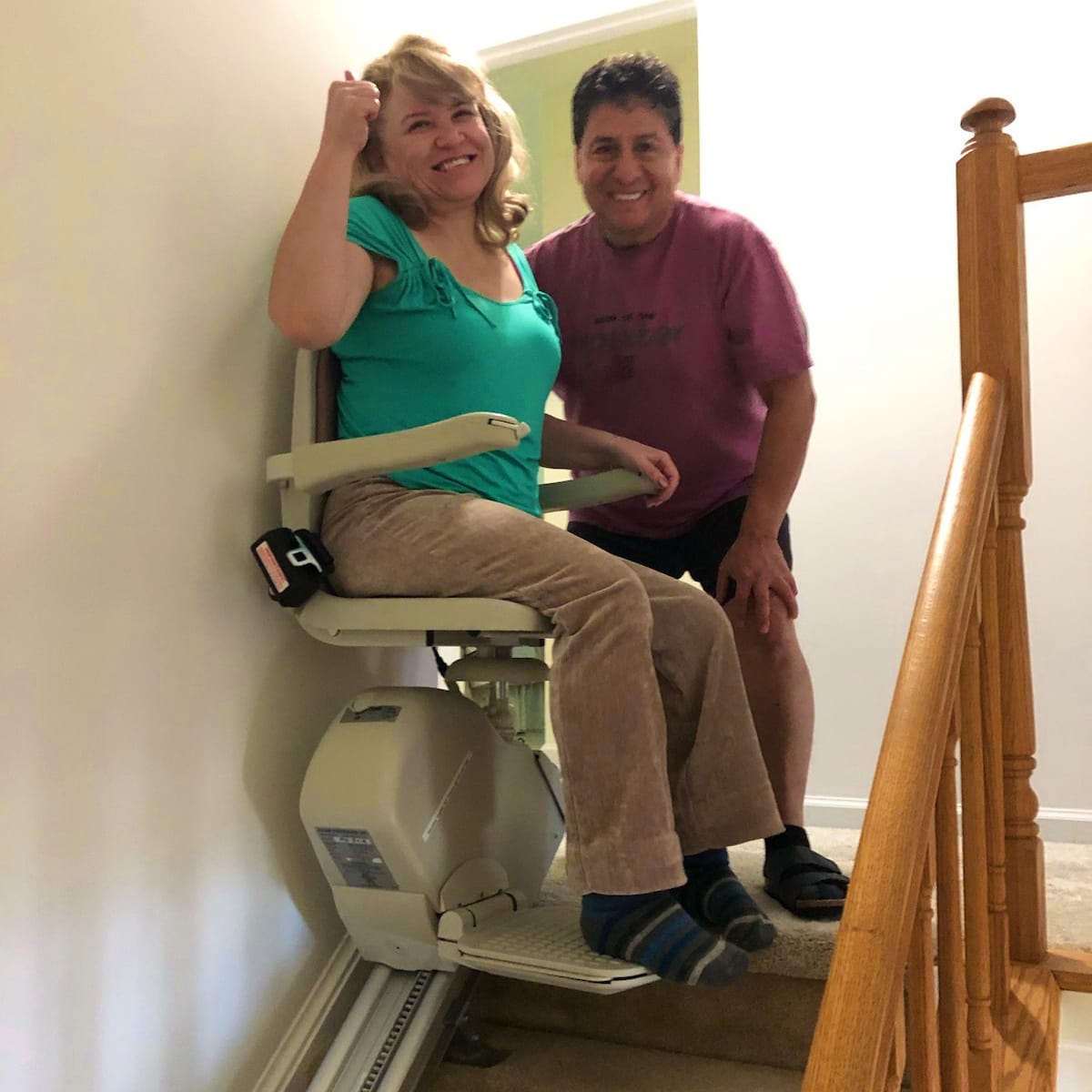
Klein also shouted out Lou Wood, an “amazing volunteer,” who “has perfected stairlifts.” In most homes, there’s a full bathroom and bedrooms upstairs. So, for many clients, an automated lift is required. “We received donated Acorn stairlifts and [Wood] will take them and spend about 10 hours per stairlift and will make sure they’re in good working order… I think we have about 40 in the community right now… They’re completely free… All of them were donated and that’s like $5000 a pop normally to be installed.”
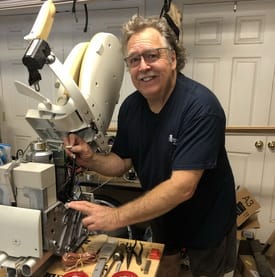
Where Do the Funds Come From?
So, how does Rebuilding Together-AFF come up with the funding for its operations? “We receive a combination of funding from local jurisdictions,” Klein said. “Individual donors are a big part of what we do, and we get donations from our volunteers, even from the people we help. They want to ‘pay it forward’ so they make small donations – we don’t charge – but, after we’re done they’ll send a check to say, ‘Thank you so much. Pay it forward.’ And people also just give at random. I’ve had people just call up and say, ‘We’ve heard about you. We’d like to donate on an ongoing basis.’... And then we have faith-based groups and corporations that donate. Some of the faith-based groups and corporations also volunteer with us. Some of them just give us funding.”
While RT-AFF is an independent nonprofit “not affiliated with any religious organization,” many faith-based groups volunteer and contribute to the group's good works. “I will say, faith-based groups have always been wonderful supporters,” Klein said. "So, Dulin United Methodist is in the City of Falls Church, right? They go in twice-a-year to work on homes and they do incredible work. And they’ve been working with us for 20 or 25 years," Klein said.
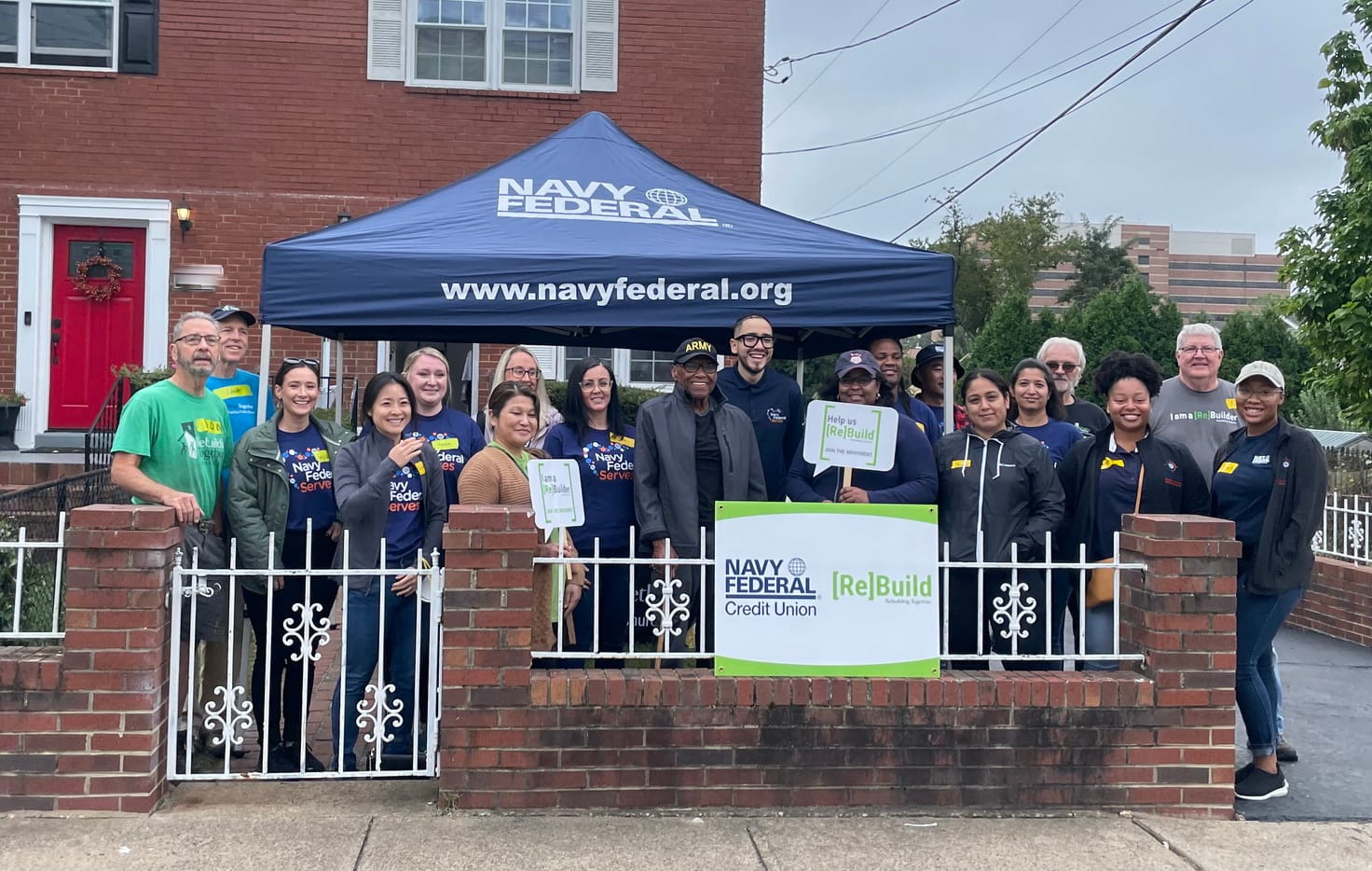
The group also receives foundation grants from such sources as Navy Federal Credit Union or Stewart Title. “We’re doing a project Tuesday in Vienna,” with Navy Federal, Klein said. “We’re doing one in Herndon tomorrow. And we just worked with Stewart Title on a nonprofit.... We’ll go into a nonprofit like [Choice, Respect, Independence] CRI, New Hope Housing, or Hartwood Foundation, to work on group homes they have. This is transitional housing provided to people, many of whom have intellectual or physical disabilities, or mental health issues.”
Working with Navy Federal Credit Union also allows RT to serve military veterans and their families. “We do help people who have served in the military. So, with Navy Federal, on Tuesday, we helped a widow of someone who served in the military for 25 years and then on Friday, we’re helping somebody who served in the military for three years and then became a U.S. Capitol police officer.”
RT also helps address environmental and educational issues in the community. “We partnered with another nonprofit called Lands and Waters,” Klein said. The group identifies as a “grassroots nonprofit dedicated to watershed protection and education.” Serving lower-income schools, the organization creates outdoor educational settings and environments. “We did one here in the City of Fairfax and in Arlington and we went in and created outdoor school settings. And Lands and Waters always did stuff on the outside, so we did garden beds and also places where kids could explore nature.”
Why the Work is So Inspiring
Asked what makes her job so inspiring, Klein didn’t hesitate to answer.
“So, you walk on a project. You see a home beforehand. You meet the people who need the help. You hear their stories. And when we go into a place, we’re going in to address health and safety hazards to make their homes more livable. We’re not going in the home to beautify it or do an ‘Extreme Makeover.’ We’re making sure people can live in their home. So, people go in there and if it’s a corporation or an inter-faith group, they go in, see what's needed and make the changes. And, I always say, ‘They get dirty, sweaty, and are tired when they go home.’ But when they leave, they know the person is safer in the home. They know they’ve impacted the person. They’ve not only impacted the house and how the person lives in the house but they’ve also brought kindness and community to this person.”
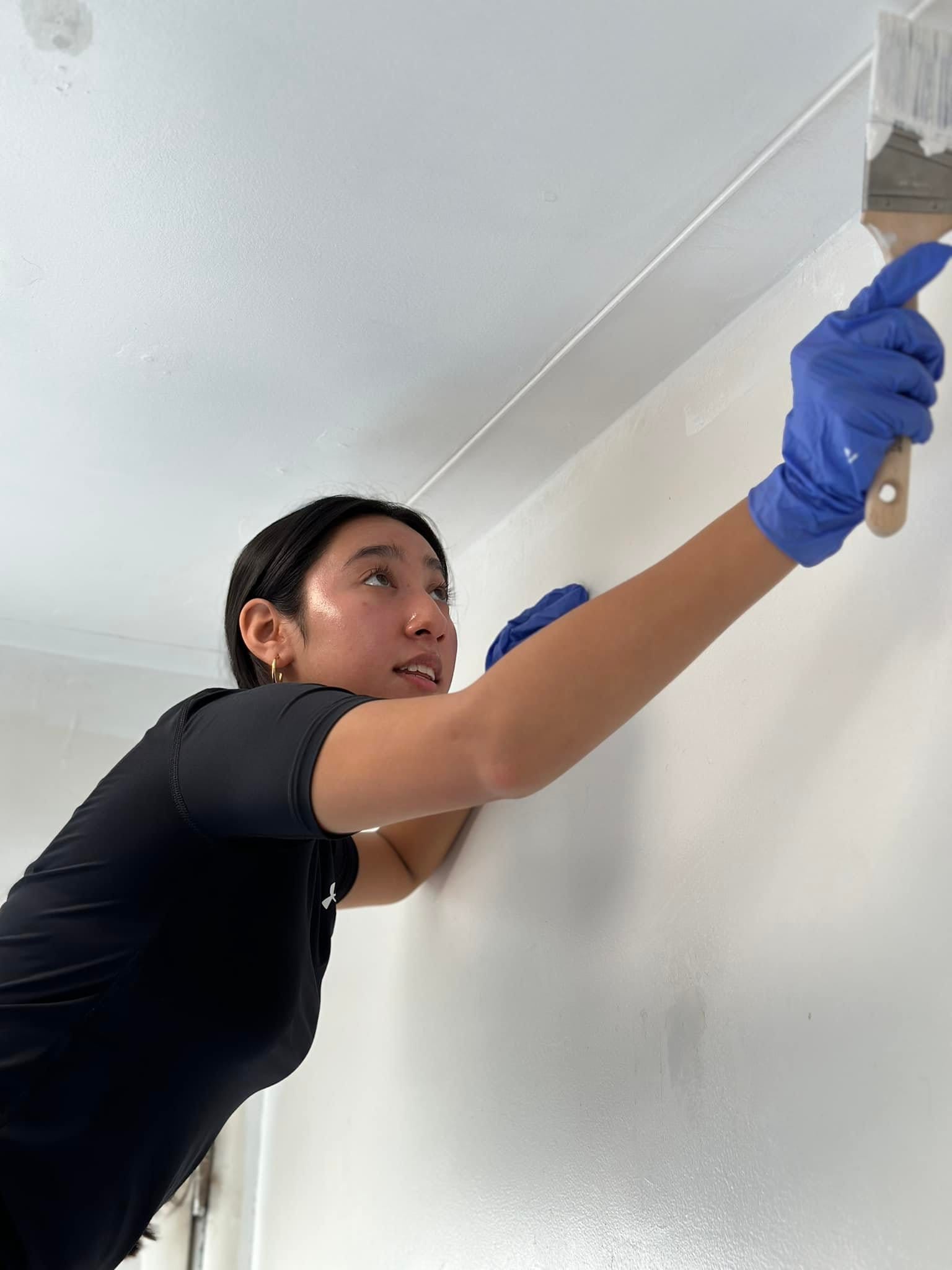
“A lot of times – and particularly when it was Covid – people were so isolated…. So, it makes people feel like their community really cares about them. And in return it’s like, what we get back, what I get back, what the volunteers get back – we get history lessons from people who’ve been around for 70, 80 or 90 years. We get to learn about their past. We get to learn about what they’ve been through. These are people who’ve given to the community but they’re at a point where financially it’s a little more difficult and they have done their service as well.”
“So, I always say we’re ‘a broker of community.’ When I grew up, my dad would go out and help our neighbors. But you don’t get a lot of that [now]. So, a lot of times, you go into communities and you don’t even see your neighbors. Everybody’s kind of on a different schedule. And sometimes we don’t know how to go about helping our neighbors. So what we do is we facilitate that. And we facilitate neighbors helping neighbors. And everybody uses that phrase, but believe me, we are.”
Rebuilding Together-AFF is located at 10723 Main Street, #135, Fairfax, Virg. Phone: 703-528-1999
By Christopher Jones




Member discussion